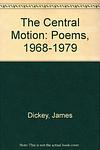James Dickey
James Dickey was an American poet and novelist. He is best known for his novel 'Deliverance' which was adapted into a popular film of the same name. Born on February 2, 1923, in Atlanta, Georgia, Dickey served as a fighter pilot in World War II and the Korean War before attending Vanderbilt University. His poetry is known for its lyrical beauty and exploration of nature and the human condition. Dickey was appointed the eighteenth United States Poet Laureate in 1966. He passed away on January 19, 1997.
Books
This list of books are ONLY the books that have been ranked on the lists that are aggregated on this site. This is not a comprehensive list of all books by this author.
-
1. Deliverance
Four friends from Atlanta embark on a canoe trip in the remote wilderness of Georgia, expecting a fun, adventurous weekend. However, their journey quickly turns into a nightmare when they are brutally attacked by a pair of backwoods locals. The friends are forced to kill their attackers in self-defense, leading to a harrowing escape down the river and through the woods, pursued by vengeful locals. The experience forever changes their lives, leaving them with deep physical and psychological scars.
-
2. The Central Motion
"The Central Motion" is a collection of poems that delves into the human experience through a blend of raw emotion and vivid imagery. The work explores themes of nature, mortality, and the essence of movement, both physical and metaphysical. The poet employs a unique voice to examine the interconnectedness of life, the tension between the individual and the collective, and the perpetual cycle of death and rebirth. With a keen eye for detail and a profound understanding of the human condition, the poems invite readers to contemplate the central motion that drives all existence.
-
3. The Early Motion
"The Early Motion" is a collection of poems that delves into the complexities of human experience, nature, and the passage of time. The poet employs vivid imagery and a deep understanding of the natural world to explore themes of growth, mortality, and the primal instincts that drive us. With a keen eye for detail and a profound sense of introspection, the poems navigate the landscapes of the American South, personal history, and the universal human condition, often blurring the lines between the wild and the civilized. The work is characterized by its lyrical intensity and emotional depth, inviting readers to reflect on their own journey through life's early motions.


